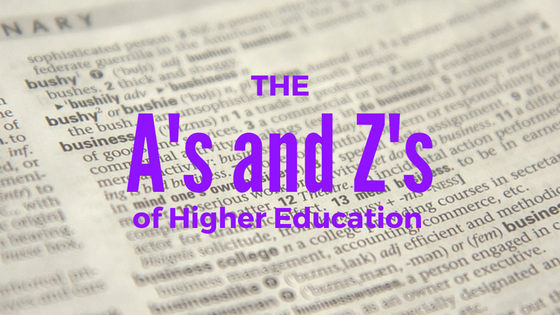
New to higher education? Read this helpful guide to learn some jargon of the higher education world!
- Academic adviser: a member of the college’s faculty who assists and advises students on academic topics.
- Academic dishonesty: the use of unauthorized assistance with the intent of deceiving a professor or evaluator, including but not limited to plagiarism, fabrication, cheating, and sabotage.
- Accreditation: the official recognition that an institution of higher education has met the standards of an accrediting association.
- Adjunct faculty: a member of the faculty who is hired to teach but is not a tenure-track member of the faculty, often employed on a part-time basis.
- Assistant professor: a member of faculty who is untenured but on tenure track.
- Associate professor: a member of faculty who has received tenure at the intermediate level.
- Associate’s degree: an undergraduate degree typically awarded by a community college within two years of full-time study.
- Asynchronous learning: a type of online course that does not require face-to-face interactions between instructors and students, allowing students to fulfill the course requirements on their own time.
- Audit: to take a course without receiving credit.
- Bachelor’s degree: an undergraduate degree typically awarded upon successful completion of a program of study, usually taking four years.
- Carnegie units: one year of study in a high school subject.
- College: an institution of higher education that typically provides only an undergraduate education.
- Commuter: a student who travels from housing off-campus that is not owned by or affiliated with their college.
- Credit: units used by a school to indicate that a student has passed specific courses that are required for graduation.
- Distance learning: a course or credit that occurs when students and instructors do not meet physically in a typical classroom fashion, often supported by technology such as teleconferencing or video calls.
- Independent study: academic work undertaken outside of the regular classroom structure under the supervision of a professor.
- Junior college: also known as community college, a public two-year college that awards associate’s degrees.
- Learning center: a center that offers assistance to students for the development of academic and time management skills, usually through tutoring and/or workshops.
- Matriculation: to enroll officially in a program at a college or university.
- Merit-based aid: a type of financial aid given by an institution to students who demonstrate special academic ability.
- Midterm: an exam or assessment typically given halfway through an academic term.
- Need-based aid: a type of financial aid given by an institution to students who cannot pay the full cost of attending their college or university.
- Non-traditional student: a student who enters college more than a year after his or her high school graduation or a student who pursues their college education while working full time.
- Open admissions: a school’s policy to accept all students who have a high school diploma, regardless of their GPA or test scores (a “nonselective” institution).
- Part-time student: a student who is still enrolled at a college or university but is not taking a full course load.
- Probation: a period of time during which students with low GPAs must improve their academic performance. Students who fail to improve their grades may be dismissed from the college or university.
- Registrar: an official at a college or university who registers students and maintains academic records.
- Remedial services: courses designed for students who do not possess the skills to complete a regular postsecondary curriculum.
- Syllabus: a document given to students who enroll in a course that includes the curriculum of the course, assignments and due dates, and instructor expectations.
- Teaching assistant (TA): a student who assists faculty with teaching an undergraduate course.
- Tenure: a status given to high-level faculty that recognizes their strong record of research and publishing that allows them to stay indefinitely in their position.
- University: an institution of higher education that provides both undergraduate and graduate degrees.
Read more:

